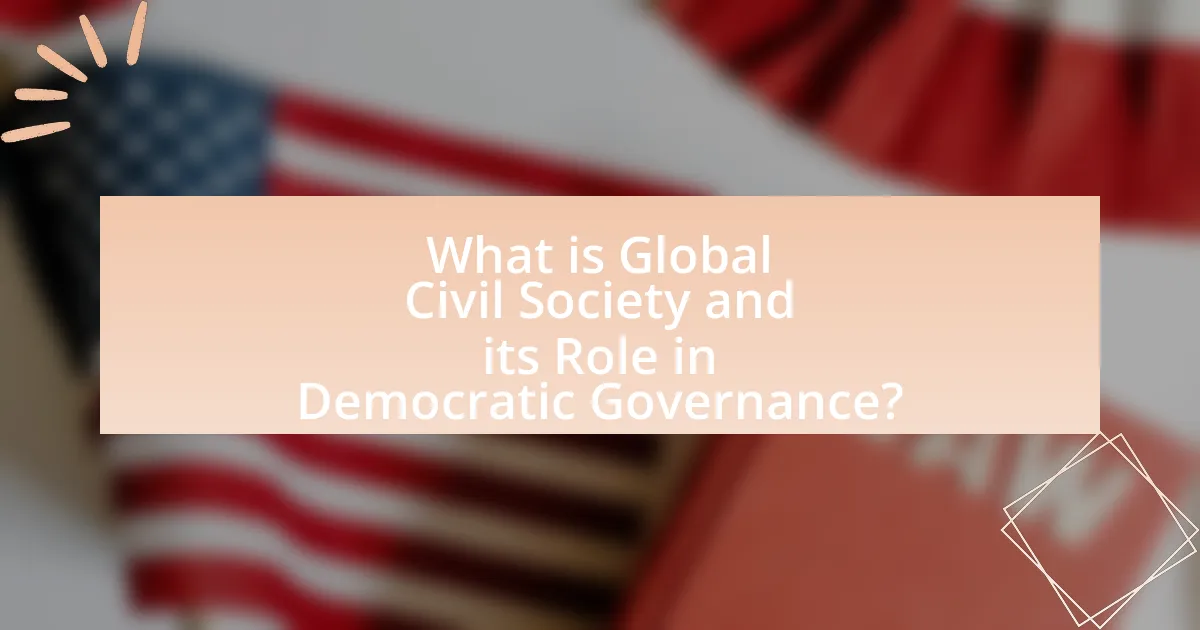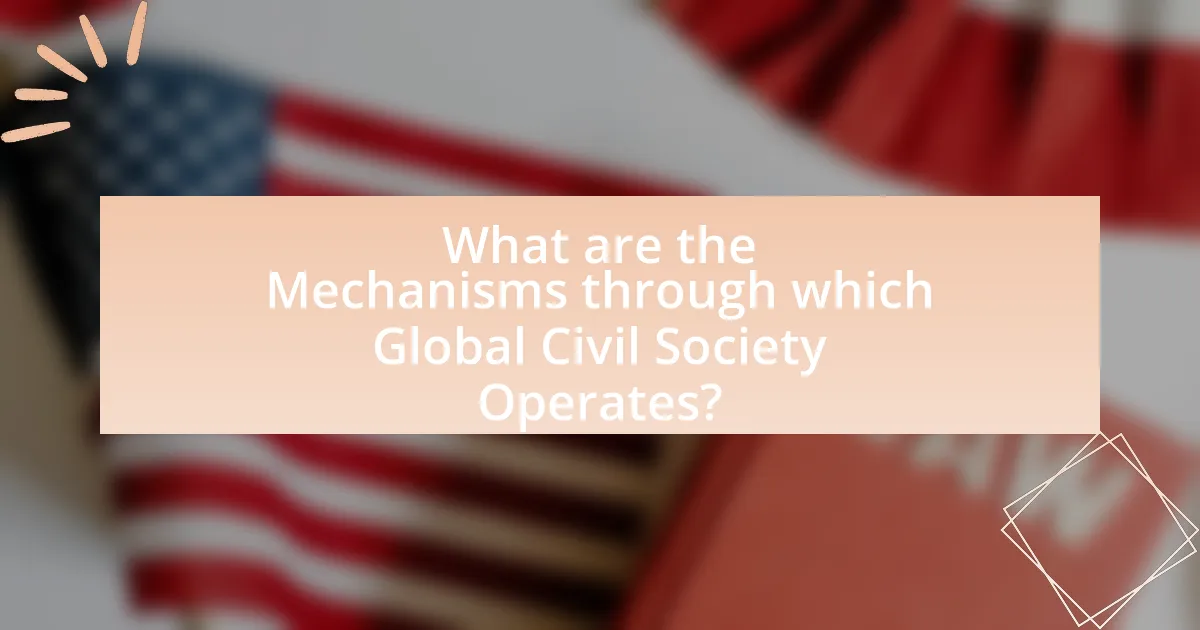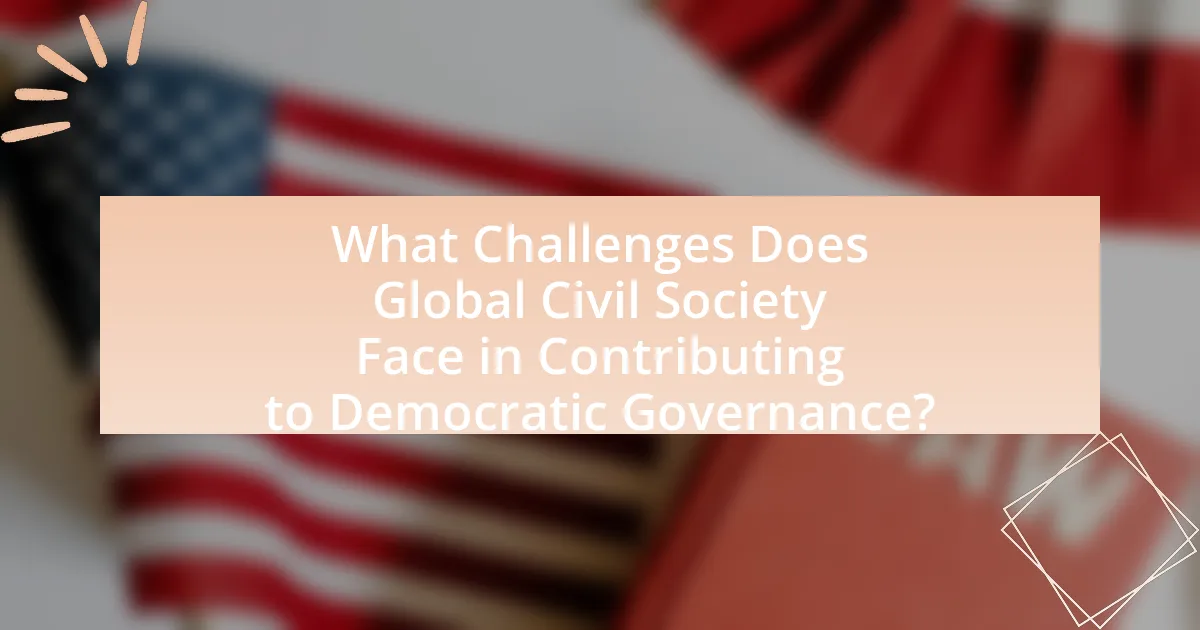Global civil society encompasses non-governmental organizations, community groups, and social movements that operate independently from state and market influences, playing a crucial role in democratic governance. This article examines how global civil society fosters civic engagement, accountability, and transparency, thereby enhancing democratic processes. Key components such as NGOs and grassroots movements are highlighted for their influence on policy-making and citizen participation. The article also addresses the challenges faced by civil society, including repression and funding limitations, while exploring strategies for collaboration and the use of technology to strengthen their impact on democracy worldwide.

What is Global Civil Society and its Role in Democratic Governance?
Global civil society refers to the collective of non-governmental organizations, community groups, and social movements that operate independently from the state and the market, advocating for various social, political, and environmental issues. Its role in democratic governance is significant as it fosters civic engagement, promotes accountability, and enhances transparency in government actions. For instance, organizations like Amnesty International and Human Rights Watch mobilize public opinion and influence policy decisions, thereby holding governments accountable to their citizens. Research indicates that countries with active civil societies tend to have stronger democratic institutions and higher levels of political participation, as evidenced by the 2019 Global Civil Society Index, which correlates robust civil engagement with improved governance outcomes.
How does Global Civil Society influence democratic processes?
Global Civil Society influences democratic processes by promoting civic engagement, advocating for human rights, and holding governments accountable. Through various organizations and movements, it mobilizes citizens to participate in political discourse, thereby enhancing democratic participation. For instance, the presence of NGOs and grassroots movements has been shown to increase voter turnout and public awareness of political issues, as evidenced by studies indicating that countries with active civil societies tend to have higher levels of democratic governance. Additionally, Global Civil Society plays a critical role in monitoring elections and advocating for transparency, which helps to ensure fair electoral processes and strengthens democratic institutions.
What are the key components of Global Civil Society?
The key components of Global Civil Society include non-governmental organizations (NGOs), social movements, community-based organizations, and transnational advocacy networks. These entities play a crucial role in promoting democratic governance by advocating for human rights, social justice, and environmental sustainability. For instance, NGOs like Amnesty International and Human Rights Watch actively monitor and report on human rights abuses, influencing policy changes at national and international levels. Social movements, such as the climate justice movement, mobilize public support and pressure governments to adopt sustainable practices. Community-based organizations empower local populations to participate in governance processes, ensuring that diverse voices are heard. Transnational advocacy networks facilitate collaboration among various stakeholders, amplifying their impact on global issues. Together, these components foster accountability, transparency, and civic engagement, essential for a thriving democracy.
How do these components interact with democratic institutions?
Components of global civil society, such as non-governmental organizations (NGOs), grassroots movements, and advocacy groups, interact with democratic institutions by promoting accountability, enhancing citizen participation, and influencing policy-making. These components serve as intermediaries between the public and government, facilitating dialogue and ensuring that diverse voices are heard in the democratic process. For instance, research by the World Bank indicates that countries with active civil societies tend to have stronger democratic institutions, as these organizations help to monitor government actions and advocate for transparency. This interaction fosters a more informed electorate and encourages civic engagement, ultimately strengthening the foundations of democracy.
Why is Global Civil Society important for democracy?
Global Civil Society is important for democracy because it fosters civic engagement, accountability, and the protection of human rights. By providing a platform for diverse voices, Global Civil Society enables citizens to participate in political processes, advocate for policy changes, and hold governments accountable. Research indicates that countries with active civil societies tend to have stronger democratic institutions and higher levels of political participation, as seen in the 2011 Arab Spring, where civil society organizations played a crucial role in mobilizing citizens for democratic reforms.
What historical examples illustrate this importance?
The importance of global civil society in contributing to democratic governance is illustrated by the anti-apartheid movement in South Africa and the fall of the Berlin Wall in 1989. The anti-apartheid movement, led by organizations like the African National Congress and supported by international civil society groups, mobilized global awareness and pressure that ultimately led to the dismantling of apartheid and the establishment of a democratic government in South Africa in 1994. Similarly, the fall of the Berlin Wall was significantly influenced by civil society organizations that advocated for human rights and democratic reforms in Eastern Europe, culminating in the reunification of Germany and the spread of democracy across the region. These examples demonstrate how organized civil society can effectively challenge oppressive regimes and promote democratic values on a global scale.
How does Global Civil Society promote civic engagement?
Global Civil Society promotes civic engagement by facilitating platforms for dialogue, advocacy, and participation among citizens. Organizations within Global Civil Society, such as non-governmental organizations (NGOs) and community groups, empower individuals by providing resources, training, and opportunities to engage in democratic processes. For instance, according to the World Bank, civil society organizations enhance civic engagement by mobilizing citizens to participate in local governance and policy-making, which leads to increased accountability and transparency in government actions. This active involvement fosters a sense of community and encourages individuals to voice their opinions and influence decision-making, thereby strengthening democratic governance.

What are the Mechanisms through which Global Civil Society Operates?
Global civil society operates through mechanisms such as advocacy, networking, and capacity building. Advocacy involves mobilizing public opinion and influencing policy decisions at local, national, and international levels, as seen in campaigns led by organizations like Amnesty International, which has successfully lobbied for human rights reforms globally. Networking facilitates collaboration among diverse groups, enabling knowledge sharing and resource pooling, exemplified by the World Social Forum, which brings together activists and organizations to discuss social justice issues. Capacity building enhances the skills and resources of civil society organizations, empowering them to effectively engage in governance processes, as demonstrated by initiatives like the Global Fund for Community Foundations, which supports local organizations in developing countries. These mechanisms collectively strengthen democratic governance by promoting accountability, transparency, and citizen participation.
How does Global Civil Society engage with governments?
Global Civil Society engages with governments primarily through advocacy, policy dialogue, and collaborative initiatives. These organizations, which include non-governmental organizations (NGOs), grassroots movements, and community groups, actively participate in shaping public policy by lobbying for specific issues, providing expert knowledge, and mobilizing public opinion. For instance, during the United Nations Climate Change Conferences, civil society groups have successfully influenced national policies by presenting research and organizing campaigns that highlight the urgency of climate action. This engagement is crucial for promoting transparency, accountability, and inclusiveness in governance, as evidenced by the increased participation of civil society in various international treaties and agreements, which has led to more democratic processes and better representation of marginalized voices.
What strategies do civil society organizations use to influence policy?
Civil society organizations influence policy through advocacy, lobbying, public campaigns, and coalition-building. Advocacy involves raising awareness and mobilizing public opinion to support specific policy changes, while lobbying directly engages policymakers to persuade them to adopt certain positions. Public campaigns utilize media and grassroots efforts to inform and rally citizens around issues, creating pressure for change. Coalition-building allows organizations to unite diverse groups, amplifying their collective voice and increasing their impact on policy discussions. For example, the Global Fund for Women successfully lobbied for gender equality policies by forming coalitions with local women’s organizations, demonstrating the effectiveness of these strategies in achieving policy influence.
How do these strategies vary across different regions?
Strategies for global civil society’s contribution to democratic governance vary significantly across regions due to differing political, cultural, and economic contexts. In North America, civil society organizations often focus on advocacy and policy reform, leveraging strong legal frameworks to influence government decisions. In contrast, in regions like Sub-Saharan Africa, strategies may center on grassroots mobilization and community engagement, addressing local governance issues and human rights violations, often in environments with limited political freedoms. For example, the African Union’s Agenda 2063 emphasizes the role of civil society in promoting democratic governance, reflecting the region’s unique challenges and aspirations.
What role does Global Civil Society play in advocacy and accountability?
Global Civil Society plays a crucial role in advocacy and accountability by mobilizing citizens, influencing policy, and holding governments accountable for their actions. Through various organizations and networks, Global Civil Society raises awareness about social issues, promotes human rights, and engages in lobbying efforts to ensure that public officials adhere to democratic principles. For instance, organizations like Amnesty International and Human Rights Watch actively document human rights abuses and advocate for policy changes, thereby enhancing governmental accountability. Additionally, Global Civil Society often collaborates with international bodies, such as the United Nations, to promote transparency and good governance, further solidifying its impact on democratic processes worldwide.
How do civil society organizations hold governments accountable?
Civil society organizations hold governments accountable by monitoring their actions, advocating for transparency, and mobilizing public opinion. These organizations engage in activities such as conducting research, publishing reports, and organizing campaigns that highlight government failures or corruption. For instance, organizations like Transparency International provide data on corruption levels, which pressures governments to implement reforms. Additionally, civil society groups often participate in policy-making processes, ensuring that citizens’ voices are represented and that government actions align with democratic principles. This engagement fosters a culture of accountability and encourages governments to adhere to their commitments to human rights and good governance.
What impact does this accountability have on governance?
Accountability significantly enhances governance by ensuring that public officials are answerable for their actions, which fosters transparency and trust in governmental institutions. When accountability mechanisms are in place, such as audits, public reporting, and civil society oversight, they deter corruption and promote ethical behavior among leaders. For instance, studies have shown that countries with strong accountability frameworks experience lower levels of corruption and higher citizen satisfaction with government performance. This correlation is evident in nations like Denmark and New Zealand, which consistently rank high in governance quality due to their robust accountability practices.

What Challenges Does Global Civil Society Face in Contributing to Democratic Governance?
Global civil society faces significant challenges in contributing to democratic governance, primarily including repression, lack of resources, and fragmentation. Repression occurs when governments impose restrictions on civil society organizations, limiting their ability to operate freely; for instance, in countries like Russia and Hungary, laws have been enacted to curtail the activities of NGOs. Lack of resources hampers the effectiveness of civil society, as many organizations struggle to secure funding, which is critical for advocacy and mobilization efforts; according to the Global Fund for Community Foundations, over 70% of grassroots organizations report insufficient funding. Fragmentation within civil society can lead to disunity and weakened collective action, as diverse groups may prioritize different agendas, diluting their overall impact on democratic governance. These challenges collectively hinder the ability of global civil society to effectively promote and sustain democratic practices.
What obstacles do civil society organizations encounter?
Civil society organizations encounter several obstacles, including restrictive legal frameworks, limited funding, and government repression. Restrictive legal frameworks often impose stringent regulations that hinder the operational capacity of these organizations, as seen in countries where laws require excessive reporting or restrict foreign funding. Limited funding is another significant challenge, as many civil society organizations rely on donations and grants, which can be inconsistent and insufficient to meet their needs. Additionally, government repression, including harassment, intimidation, and violence against activists, poses a serious threat to their ability to operate freely and advocate for democratic governance. These obstacles collectively undermine the effectiveness of civil society organizations in promoting democratic values and accountability.
How do political repression and legal restrictions affect their work?
Political repression and legal restrictions significantly hinder the work of civil society organizations by limiting their ability to operate freely and advocate for democratic governance. These constraints often manifest as censorship, harassment, and legal barriers that prevent organizations from mobilizing resources, engaging with communities, and influencing policy. For instance, in countries with stringent laws against protests or public gatherings, civil society groups struggle to organize events that promote democratic participation, thereby stifling public discourse and civic engagement. Furthermore, according to the Freedom House report, in 2021, 73 countries experienced a decline in political rights and civil liberties, illustrating the widespread impact of repression on civil society’s effectiveness in promoting democracy.
What are the implications of funding limitations for civil society?
Funding limitations for civil society lead to reduced capacity for advocacy, service delivery, and community engagement. When financial resources are scarce, organizations struggle to maintain operations, which diminishes their ability to influence policy and hold governments accountable. For instance, a report by the International Center for Not-for-Profit Law indicates that funding cuts can result in the closure of vital programs that support marginalized communities, thereby weakening democratic processes. Additionally, limited funding often forces civil society organizations to prioritize short-term projects over long-term initiatives, undermining their effectiveness in fostering sustainable democratic governance.
How can Global Civil Society overcome these challenges?
Global Civil Society can overcome challenges by fostering collaboration among diverse stakeholders, including NGOs, grassroots organizations, and international bodies. This collaboration enhances resource sharing, amplifies voices, and strengthens advocacy efforts, which are crucial for addressing issues like political repression and social inequality. For instance, the Global Fund for Community Foundations reported that partnerships between local organizations and international NGOs have led to more effective community-driven initiatives, demonstrating that collective action can yield significant results in promoting democratic governance.
What strategies have proven effective in enhancing resilience?
Effective strategies for enhancing resilience include fostering social connections, promoting mental health awareness, and encouraging adaptive coping skills. Research indicates that strong social networks provide emotional support, which is crucial during crises, as evidenced by studies showing that individuals with robust social ties report lower levels of stress and better overall well-being. Additionally, mental health initiatives, such as community-based programs, have been shown to improve individuals’ ability to cope with adversity, with data from the World Health Organization highlighting that mental health interventions can reduce the incidence of mental disorders by up to 20%. Finally, teaching adaptive coping strategies, such as problem-solving and emotional regulation, has been validated through various psychological studies, demonstrating that individuals equipped with these skills are more likely to navigate challenges effectively and maintain their mental health.
How can international support bolster civil society efforts?
International support can bolster civil society efforts by providing essential resources, capacity building, and advocacy platforms. Financial assistance from international organizations enables civil society groups to implement programs that promote democratic governance, such as voter education and human rights initiatives. For instance, the United Nations Development Programme has funded various civil society projects that enhance civic engagement and accountability in governance. Additionally, international partnerships facilitate knowledge sharing and best practices, empowering local organizations to strengthen their impact. Research indicates that countries with robust international support for civil society experience higher levels of political participation and transparency, contributing to more resilient democratic systems.
What Best Practices Can Enhance the Impact of Global Civil Society on Democracy?
Best practices that can enhance the impact of global civil society on democracy include fostering collaboration among diverse organizations, promoting transparency and accountability, and leveraging technology for advocacy. Collaboration among various civil society organizations allows for a unified approach to address democratic challenges, as seen in the successful coalitions formed during the Arab Spring, which mobilized citizens for democratic reforms. Promoting transparency and accountability within civil society organizations builds trust with the public and stakeholders, exemplified by initiatives like the International Aid Transparency Initiative, which encourages open data practices. Additionally, leveraging technology, such as social media platforms, has proven effective in mobilizing support and disseminating information rapidly, as demonstrated by the global reach of movements like #MeToo and Black Lives Matter, which have significantly influenced democratic discourse and policy changes.
How can civil society organizations effectively collaborate with each other?
Civil society organizations can effectively collaborate with each other by establishing clear communication channels, sharing resources, and aligning their goals towards common objectives. Effective collaboration is facilitated through regular meetings, joint initiatives, and the use of digital platforms for information exchange. For instance, the Global Partnership for Social Accountability demonstrates how organizations can work together to enhance transparency and accountability in governance by pooling their expertise and resources. This collaborative approach not only strengthens their individual capacities but also amplifies their collective impact on democratic governance.
What role does technology play in strengthening civil society initiatives?
Technology plays a crucial role in strengthening civil society initiatives by enhancing communication, mobilization, and transparency. Digital platforms enable civil society organizations to reach wider audiences, facilitating grassroots movements and advocacy campaigns. For instance, social media has been instrumental in organizing protests and raising awareness on issues such as human rights and environmental protection, as seen in movements like the Arab Spring. Additionally, technology fosters transparency through tools like blockchain, which can track donations and ensure accountability in funding. According to a report by the United Nations Development Programme, 70% of civil society organizations utilize digital tools to improve their outreach and effectiveness, demonstrating the significant impact of technology on their operations.